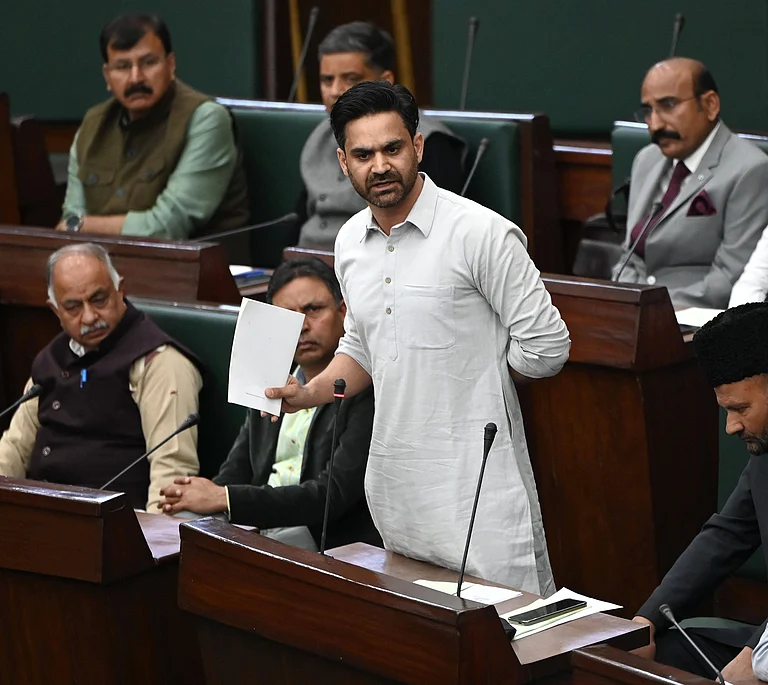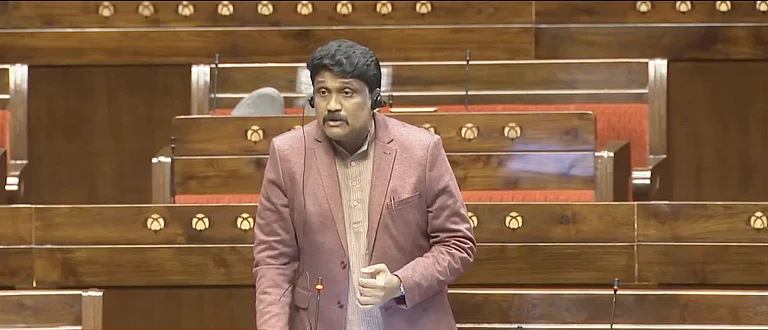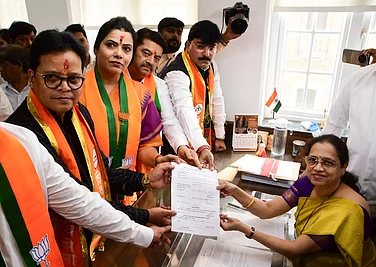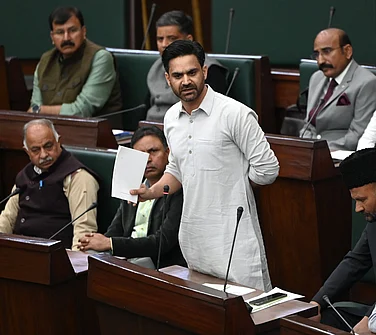IF the Naxal movement in Central India ever had a Bob Dylan, then this must be he. The phenomenon that is Gummuda Gaddar combines the attributes of poet, folk singer, revolutionary and underground activist. Gaddar, the "commercialised Naxalite", has not lost his sparkle despite having been served a six-month suspension by the People's War Group (PWG) for straying from the Naxal way of life.
Gaddar's poems are written from his den at his unpretentious house in Venkatapuram, Secundarabad. On his shelf, cassettes of Amjad Ali Khan share space with Phil Collins, SNAP and Dance club hits from the UK—as well as tomes of Mao TseTung. The room reflects Gaddar's approach to songwriting. "I listen to all kinds of music. I take my ideas from different cultures. But finally my songs have a political consciousness. It always reflects the struggle of the people, their concerns, their problems."
Gaddar comes across as surprisingly casual and collected for someone who has been slapped with a string of charges by the PWG, an organisation that he has served for 25 years. The allegation against him is that his interest in the PWG movement has waned in the last four years and he has become self-seeking and commercial. The reasons for the suspension pending investigation, spelt out in a recent PWG circular are:
- Misuse of party name and funds for self-improvement.
- Selling revolutionary songs to commercial cinema.
- Starting the Maha Bodhi Vidyalaya, an English medium school, and collecting "lakhs of rupees" for its construction.
- Publishing books without the approval of the party and the Jan Natya Mandal (JNM), the cultural wing of the PWG, of which Gaddar was the secretary.
- Not providing accounts for Rs 4.5 lakh which had come from the sale of JNM audio cassettes.
- Appearing at meetings organised by Vijay Bhaskar Reddy of the Congress.
- Starting a parallel cultural organisation called the Jha Jhumaka Trust and planning to set up a museum of music.
Gaddar admits that he is guilty of not seeking prior sanction from the party before starting the school and penning the lyrics of the movie Ore Rickshaw. But he denies he has pocketed money raised in the name of the party. Says Gaddar: "Letthose who make these allegations prove it."
The firebrand singer-songwriter who has written over 250 songs, admits that when he started the Maha Bodhi Vidyalaya four years ago, some of his close friends in the film industry came forward with donations. "This money was for the school. I have not misappropriated a single paise. Do I live like a man who has pocketed lakhs?" asks Gaddar, pointing to his rather humble dwelling. The official spokesperson of the PWG does not question Gaddar's honesty, but points out that "party discipline is party discipline".
Gaddar has close links with filmmakers. It was noted director Vir Narasimha Rao who inspired the young singer to join the Naxal movement 25 years ago. Gaddar , an Osmania Engineering College dropout, quit his job in Canara Bank and ever since has been a major draw at political rallies. Says Vara Vara Rao, known Naxalite poet and general secretary of the All India League for Revolutionary Culture which is close to the PWG: "Gaddar's is a very electrifying performance. But then you must not forget that the people's movement made Gaddar. No individual is important in a revolutionary movement."
Though he has been temporarily banned from performing at PWG rallies, the 50-year-old lyricist's six songs featured in the film Ore Rickshaw are quite the rage in Andhra Pradesh. Here too Gaddar denies accepting any money. "The producer and director are known to me. I felt the songs would reach out to a wider audience through cinema. But I did not take any money for the lyrics." Vara Vara Rao and other members of the PWG contacted are of the view that "imperialist technology" cannot be used in a people's movement. Says Rao: "I feel that the use of cinema corrupts the message a revolutionary movement has in mind. Let us go to the people with people's technology not audio tapes and films."
The question is, why has the PWG decided to act against Gaddar now. Party leaders admit that they have reacted late to Gaddar's activities. But according to sources, there has been a move to rein in old school members like Gaddar ever since the ban on the PWG was lifted by the TDP government. Besides, the direction of the movement has changed course from the days when it was underground. Says a PWG spokesperson: "We are now focusing on setting up committees which will take up the people's issues with the elected representatives and force them to act. But the days of militancy are over, at least for now."
Gaddar, sources says, has upset the PWG leadership by his independent style of functioning. A section in the PWG feels that the singer has been very critical about the party functioning. Gaddar denies this saying: "I believe in the movement. I have great respect for the PWG. For years I left my wife Vimala and my three kids to fend for themselves. I did all this for the party. But you must remember that I am a singer and my life is a song. Whatever happens I won't stop singing. For five years I was underground. Even then I went to the people with my song. No one can stop me."
Gaddar's popularity is tremendous. Few in Hyderabad have not heard of him. His songs, sung to simple rhythmic folk tunes, are rich in satire, question the present political system and dream of a better tomorrow. Though vitriolic in content, the songs touch a universal chord.
For Gaddar the world is very much a stage. Raw energy pours forth from him as he pounds on his bedside table as if it were a drum, and renders a sampling of his songs. The Naxal movement may have changed, but Gaddar's song remains the same.






















